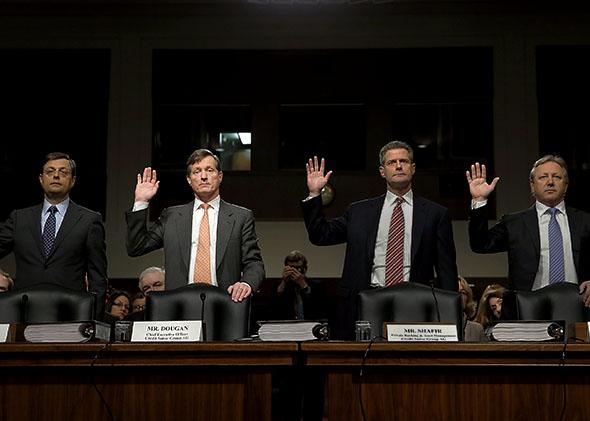Eric Holder would like you to believe that the era of “too big to jail” is over.
Seriously, guys. He means it. The attorney general said so much yesterday while announcing that Swiss bank Credit Suisse had pleaded guilty to helping Americans evade their taxes for decades using secret accounts, cash handoffs, and other delightful stratagems. It’s the first global bank to cop to criminal charges in the U.S. since Crédit Lyonnais admitted in 2004 that it had “made false statements” to the Federal Reserve, and is the most prominent financial institution to enter a plea since Drexel Burnham Lambert did so in 1989. This, Holder says, should put to rest the notion that global banks are simply too large and too important to the economy ever to prosecute. Which, of course, is a problem Holder openly acknowledged last year while testifying before Congress, but has denied ever since.
“This case shows that no financial institution, no matter its size or global reach, is above the law,” Holder said during his prepared remarks yesterday. “We will never hesitate to criminally sanction any company or individual that breaks the law. A company’s profitability or market share can never and will never be used as a shield from prosecution or penalty.”
Oddly, though, it feels as if that’s exactly what happened in this case. The Justice Department worked hard to secure a plea. But it did so by shielding Credit Suisse from the worst consequences of a criminal conviction. During negotiations, the New York Times reports, prosecutors met with both the Federal Reserve and New York’s Department of Financial Services to make sure they would not revoke Credit Suisse’s charter, which would effectively put it out of business. The Securities and Exchange Commission also voted to temporarily exempt the institution “from a federal law that requires a bank to hand over its investment-adviser license in the event of a guilty plea,” according to the Times.
In short, the feds have delivered criminal conviction largely in name only. Credit Suisse will pay $2.6 billion in penalties, and will have an independent monitor to babysit it for two years. It may lose some business from clients that are barred from patronizing a bank with a conviction on its record. Some of its lower-level bankers, who did things like ferry cash around in suitcases, have faced indictments. Otherwise, it’s back to business as usual.
This is something of an improvement over the deal Justice struck with Swiss-based UBS over tax evasion allegations in 2009, when the bank avoided criminal charges by paying a $780 million fine. But it pales in comparison to the aggressive effort prosecutors put into pursuing Switzerland’s oldest bank, Wegelin, for similar wrongdoing. After being indicted, the much smaller institution ultimately pleaded guilty and closed last year. For Credit Suisse, size clearly worked to its advantage.
“The value of a criminal admission only has symbolic value to let the public know the Justice Department is out there doing its job,” Roy Smith, a finance professor at New York University’s Stern School of Business, told Bloomberg. “I don’t think it extracts anything other than an opportunity to register a symbolic victory.”
If only it were clear what this particular win symbolized. We now know that Justice prosecutors are willing to bring cases against foreign financial institutions—at the moment, it’s working on a separate deal with French bank and financial services company BNP Paribas over charges that it violated sanctions against countries like Iran and Sudan. But will the U.S. make the same kinds of plays against American financial institutions?
Sure, government lawyers have reportedly opened a criminal investigation into Citigroup. But in the past, the federal regulators that oversee major U.S. banks—as opposed to their international brethren—haven’t been willing to promise mercy for firms that plead guilty. The Office of the Comptroller of the Currency, for instance, refused to assure prosecutors that it wouldn’t go after JPMorgan Chase & Co.’s charter if it were convicted on charges related to the Bernard Madoff debacle. Without a change of heart on their part, it’s hard to imagine the Credit Suisse case as anything more than a signal that the U.S. is willing to be mildly punitive toward bankers who speak English as a second language.
From an economic perspective, that’s not necessarily a tragedy. The Justice Department began shying away from bringing criminal cases against major corporations after its prosecution of Arthur Andersen for its role in the Enron scandal put the accounting firm out of business and cost 85,000 people their jobs. Nobody wants to risk causing a panic by administering the death penalty to a global megabank. Nobody wants a self-inflicted Lehman moment.
But that only speaks to the absurdity of the financial system as it stands today. We should bring down the full force of the law on a bank that aided and abetted plain-old tax fraud, and we should be able to do it without posing a risk to the economy. But because of the size and fragility of our banks, we can’t. This might be less of a problem if senior executives occasionally faced jail time, since that would create a strong incentive for institutions to avoid obviously criminal behavior. But of course that’s a rarity as well.
Too big to jail is dead. Long live too big to jail.
